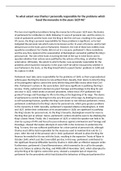To what extent was Charles I personally responsible for the problems which
faced the monarchy in the years 1629-46?
The two most significant problems facing the monarchy in the years 1629 were the desires
of parliament for retribution in 1640, following 11 years of personal rule, and the victory in
1646 of parliament and the Scots over the King in the first civil war, resulting in his capture.
Of course, the King’s personal responsibility for these problems is significant, as he had
instigated the personal rule which came to be known as the 11 years of tyranny, and he had
declared war on the Scots and on Parliament. However, the role of these two entities must
equally be considered, for Charles did not act in a vacuum; parliament’s three resolutions
and the way they rejoiced at the assassination of Buckingham somewhat justified the King’s
personal rule. The role of the Scots in turning the tide of the war in 1643 forces one to
question whether their actions were justified by the actions of the King, or whether they
acted alone. Ultimately, the extent to which Charles I was personally responsible for the
problems which faced the monarchy in the years 1629-46 will be measured by whether it
was Parliament, the Scots, or the King himself which caused Charles’ problems in 1640 and
his capture in 1646.
Parliament must take some responsibility for the problems of 1640, as their unprecedented
actions gave the King the licence to rule without them. Equally, their desire to strip the King
of his prerogative right to control the army left the King with little choice other than Civil
War. Parliament’s actions in the years before 1629 were significant in justifying the King’s
tyranny. Firstly, parliament’s decision to grant Tonnage and Poundage to the King for just
one year in 1625, which broke an ancient precedent, where since 1414 parliament had
granted Tonnage and Poundage for life to the King at the beginning of his reign. This desire
of parliament to control the King from the very first year of his reign, by limiting his access
to self-sustaining finances, justifies the King’s own desire to rule without parliament. Hence,
parliament contributed to the King’s desire for personal rule, which gave greater problems
to the monarchy in 1640. Secondly, parliament’s repeated attacks on Buckingham, in 1626
and 1627, before their celebration at his assassination in 1628, are significant in justifying
the King’s desire for personal rule. As the King’s favourite, Buckingham meant far more to
the King than just an advisor. Hence, parliament’s actions should be seen to be attacking the
King’s closest friend. Finally, the 3 resolutions of 1629, in which the speaker was held in his
chair by a group of MPs and forced to pass ordnances against arminianism and Tonnage and
Poundage, showed the lawless attempts of some MPs in the Commons to undermine the
King. To many, this was sufficient justification for a short period of personal rule, although
Charles must still be held responsible for the measures used to maintain that rule for 11
years. After the end of the personal rule in 1640, parliament refused to allow the King the
finances he needed for his war with the Scots, resulting in the expensive Treaty of Ripon in
October 1640, which cost the Crown £850 per day. In this way, parliament contributed to
the significant financial difficulties faced by Charles in 1640 after an effective taxpayer strike.
Furthermore, parliament’s Grand Remonstrance, which seemed to be a call to the people,
due to its failure to address the King, and Militia Bill of November 1641, which attempted to
strip the King of his right to control the army, showed a complete lack of respect by
parliament for the precedents which had dictated the behaviour of King and parliament for




